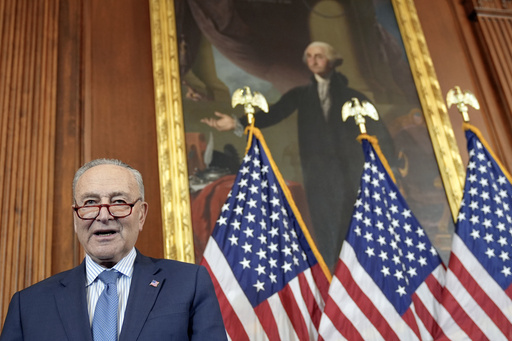The Senate approved a defense authorization bill on Wednesday that outlines a substantial pay increase for junior enlisted military personnel, addresses rising tensions with China, and raises overall military expenditure to $895 billion. However, it removes coverage for transgender medical treatments for the offspring of service members.
Typically, the annual defense bill enjoys robust bipartisan backing and has successfully passed through Congress for nearly sixty years. Yet, recent iterations of this legislation have become contentious arenas for cultural debates. This year, Republicans pushed for the inclusion of measures that align with conservative social values, complicating negotiations and decreasing Democratic support.
Despite these tensions, the bill secured a considerable vote, passing 85-14 and moving on to President Biden for approval. Among those who opposed the bill were eleven senators affiliated with the Democratic Party and three Republicans.
Senate Majority Leader Chuck Schumer, a Democrat from New York, acknowledged in a speech that while the bill isn’t flawless, it includes positive elements championed by Democrats. He highlighted its provisions aimed at countering the Chinese Communist Party’s influence on national security.
In the House, a significant number of Democratic representatives voted against the bill due to House Speaker Mike Johnson’s insistence on prohibiting transgender medical care for minors within the military health system. However, the legislation passed with a vote of 281-140.
Senate Republicans asserted that the proposed 1% increase in defense spending was inadequate in light of global uncertainties and challenges to U.S. authority. They have advocated for a more substantial defense budget, aiming for a major funding boost next year when they could gain control over both Congress and the White House.
Republican Senator Roger Wicker emphasized that the U.S. faces complex national security challenges reminiscent of World War II. He is advocating for increased defense allocations that exceed the limits set by last year’s bipartisan agreement to suspend the national debt ceiling.
While the defense bill establishes critical Pentagon policies, it will require additional backing through an appropriations package to be fully implemented.
Senate Republican leader Mitch McConnell noted that without a substantial increase in budgetary allocations, essential provisions like pay increases for enlisted service members would be compromised by necessary investment in vital weapon systems and munitions.
The legislation includes a 14.5% pay increase for junior enlisted personnel and a 4.5% raise for other military members. Lawmakers pointed out that these increases are crucial in enhancing service members’ living conditions, particularly as many military families currently rely on food banks and government assistance.
Senator Jack Reed, who chairs the Senate Armed Services Committee, pointed out the many quality of life improvements encompassed in the bill, which includes enhancements in childcare, housing, medical services, and employment support for military spouses.
Additionally, the bill includes a clause to reverse a $100 monthly cut in unemployment and sickness benefits affecting approximately 200,000 rail workers across the nation. This reform was motivated by a rare collaboration between the railroads and their unions to advocate for change.
The legislation also emphasizes a more assertive stance toward China, establishing a fund that could facilitate military resource allocation to Taiwan, similar to U.S. support for Ukraine. It further advances new military technologies, including artificial intelligence, and enhances U.S. ammunition production.
In recent years, steps have been taken to prevent the military from acquiring Chinese products, and the defense bill extends these regulations, banning Chinese items ranging from garlic in military commissaries to drone technology.
In response to this legislation, the Chinese foreign ministry dismissed the bans. A ministry representative described the insinuation that garlic represents a national security threat as absurd, questioning whether the U.S. had provided any credible evidence to justify such claims.
Nevertheless, bipartisan consensus exists within Congress regarding the perceived rising threat posed by China. The disputes among lawmakers primarily hinge on cultural issues, which have delayed the bill’s finalization for several months.
Earlier in the year, the Republican-led House passed a version of the bill that sought to eliminate reimbursements for service members traveling for abortions, ended gender-affirming care for transgender troops, and diminished diversity initiatives within the military.
Although many of these provisions did not make it into the final draft, Republicans remain optimistic that Donald Trump will implement significant changes to Pentagon policies upon his anticipated return to the White House in January.
Despite the bill’s approval, it maintains restrictions on funding for teaching critical race theory within military ranks and prohibits TRICARE health plans from covering gender dysphoria treatments for minors if such treatments could lead to sterilization.
Mike Zamore from the American Civil Liberties Union has urged President Biden to veto the bill, arguing that it forces numerous active-duty service members to make a difficult choice between their military careers and their transgender children’s welfare.
Senator Tammy Baldwin of Wisconsin, who has historically supported the National Defense Authorization Act (NDAA), voiced her opposition this year, expressing concern that the policy changes regarding transgender youth would impact an estimated 6,000 to 7,000 families.
Baldwin lamented that the NDAA has traditionally symbolized unity over division, emphasizing that the defense of the nation should remain above partisan politics. She expressed disappointment that this year’s version betrayed this principle by undermining the healthcare rights of service members’ children.


